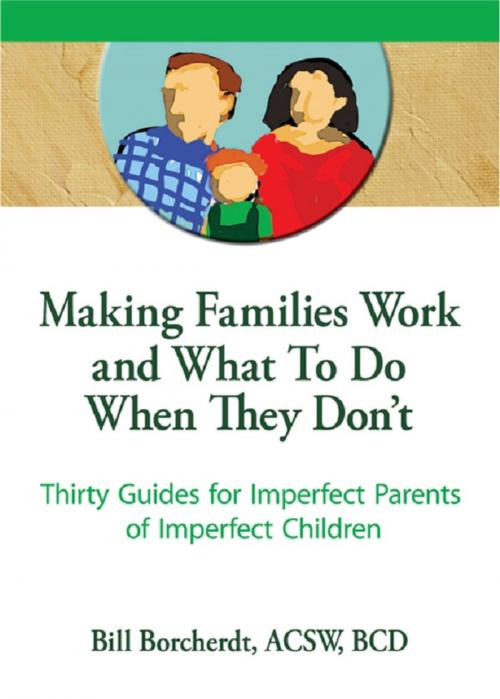Making Families Work and What To Do When They Don't
Thirty Guides for Imperfect Parents of Imperfect Children
Nonfiction, Health & Well Being, Medical, Patient Care, Health Care Delivery, Allied Health Services| Author: | Terry S Trepper, Bill Borcherdt | ISBN: | 9781136373190 |
| Publisher: | Taylor and Francis | Publication: | February 1, 2013 |
| Imprint: | Routledge | Language: | English |
| Author: | Terry S Trepper, Bill Borcherdt |
| ISBN: | 9781136373190 |
| Publisher: | Taylor and Francis |
| Publication: | February 1, 2013 |
| Imprint: | Routledge |
| Language: | English |
Making Families Work and What To Do When They Don't offers specific recommendations for increasing family harmony through more effective parenting practices. This important new book helps parents improve family understanding and relationships by reducing the emotional interference--anger, betrayal, guilt, shame, and fear--that blocks healthier and happier family connections. Each chapter is laced with knowledge and therapeutic humor that examine dimensions to family living in a way that helps parents lighten up a little rather than tighten up a lot. Parents will find that encouraging family members to take one another less seriously increases their opportunities for more constructive interactions.
Marital and family counselors, social workers, psychologists, guidance counselors, psychiatrists, and other human service professionals can use the valuable information in this book to help families view their interfamilial relationships more objectively and to take each other less seriously, creating more constructive interactions and happier, stronger relationships. Therapists will learn to encourage clients to question and challenge conventional ideas of the family that often lead to demands, exaggerations, irrational expectations, personalizations, and self- and other judgments, all of which contaminate the family relationship.
Using the scientific principles of rational thinking, Author Bill Borcherdt questions the relationship between parents and their children and the degree of influence parents have over their children. He places the focus on a parental advocacy model by which parents are encouraged to give themselves some emotional slack and to develop a sense of humility for what they can and cannot do for their children. This starts the process of family members learning what to realistically expect and accept from one another. Borcherdt shows readers that by taking the sacredness and “golden” rules out of the definitions of family living, emotional upset and oppositional behavioral obstacles can be minimized and more emotional well-being and family fulfillment can be experienced.
Each chapter in Making Families Work and What To Do When They Don't is lined with knowledge and therapeutic humor that examines dimensions of family living in a way that assists families in loosening up a little rather than tightening up a lot. This improves family members’understanding of and relationships among one another by reducing the emotional interference--feelings of anger, betrayal, guilt, shame, fear--that blocks healthy, happy family connections and by offering specific practical recommendations for increasing family harmony. Through his analyses of 30 topics of family living, presented under the umbrella of learning what to realistically expect of imperfect parents of imperfect children in an imperfect world, Borcherdt reveals to readers that:
-
individuals are active participants in creating their own emotional problems and disturbances
-
people exaggerate the significance of past family disturbances
-
emotional slack and fewer unrealistic demands of self and others leads to a happier family
-
family members often disturb themselves unnecessarily by escalating family values into sacred demands
-
families don't shape character, they reveal it
Unlike other books about family living, Making Families Work and What To Do When They Don't analyzes the dysfunctional ideas that family members hold about themselves and others rather than the dysfunctional relationships that naturally exist between fallible human beings. In this guidebook, readers learn creative, new ways of approaching old family problems,and they gain succinct explanations of how they can help their own and other families do things differently and do different things to improve emotional and behavioral well-being within the family.
Making Families Work and What To Do When They Don't offers specific recommendations for increasing family harmony through more effective parenting practices. This important new book helps parents improve family understanding and relationships by reducing the emotional interference--anger, betrayal, guilt, shame, and fear--that blocks healthier and happier family connections. Each chapter is laced with knowledge and therapeutic humor that examine dimensions to family living in a way that helps parents lighten up a little rather than tighten up a lot. Parents will find that encouraging family members to take one another less seriously increases their opportunities for more constructive interactions.
Marital and family counselors, social workers, psychologists, guidance counselors, psychiatrists, and other human service professionals can use the valuable information in this book to help families view their interfamilial relationships more objectively and to take each other less seriously, creating more constructive interactions and happier, stronger relationships. Therapists will learn to encourage clients to question and challenge conventional ideas of the family that often lead to demands, exaggerations, irrational expectations, personalizations, and self- and other judgments, all of which contaminate the family relationship.
Using the scientific principles of rational thinking, Author Bill Borcherdt questions the relationship between parents and their children and the degree of influence parents have over their children. He places the focus on a parental advocacy model by which parents are encouraged to give themselves some emotional slack and to develop a sense of humility for what they can and cannot do for their children. This starts the process of family members learning what to realistically expect and accept from one another. Borcherdt shows readers that by taking the sacredness and “golden” rules out of the definitions of family living, emotional upset and oppositional behavioral obstacles can be minimized and more emotional well-being and family fulfillment can be experienced.
Each chapter in Making Families Work and What To Do When They Don't is lined with knowledge and therapeutic humor that examines dimensions of family living in a way that assists families in loosening up a little rather than tightening up a lot. This improves family members’understanding of and relationships among one another by reducing the emotional interference--feelings of anger, betrayal, guilt, shame, fear--that blocks healthy, happy family connections and by offering specific practical recommendations for increasing family harmony. Through his analyses of 30 topics of family living, presented under the umbrella of learning what to realistically expect of imperfect parents of imperfect children in an imperfect world, Borcherdt reveals to readers that:
-
individuals are active participants in creating their own emotional problems and disturbances
-
people exaggerate the significance of past family disturbances
-
emotional slack and fewer unrealistic demands of self and others leads to a happier family
-
family members often disturb themselves unnecessarily by escalating family values into sacred demands
-
families don't shape character, they reveal it
Unlike other books about family living, Making Families Work and What To Do When They Don't analyzes the dysfunctional ideas that family members hold about themselves and others rather than the dysfunctional relationships that naturally exist between fallible human beings. In this guidebook, readers learn creative, new ways of approaching old family problems,and they gain succinct explanations of how they can help their own and other families do things differently and do different things to improve emotional and behavioral well-being within the family.















